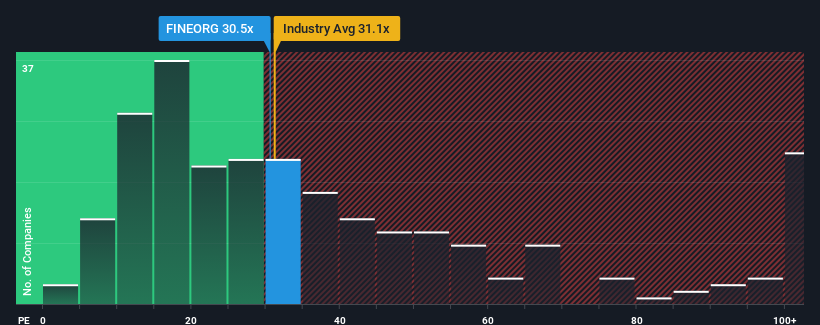What Fine Organic Industries Limited's (NSE:FINEORG) P/E Is Not Telling You
It's not a stretch to say that Fine Organic Industries Limited's (NSE:FINEORG) price-to-earnings (or "P/E") ratio of 30.5x right now seems quite "middle-of-the-road" compared to the market in India, where the median P/E ratio is around 31x. Although, it's not wise to simply ignore the P/E without explanation as investors may be disregarding a distinct opportunity or a costly mistake.
Fine Organic Industries hasn't been tracking well recently as its declining earnings compare poorly to other companies, which have seen some growth on average. It might be that many expect the dour earnings performance to strengthen positively, which has kept the P/E from falling. If not, then existing shareholders may be a little nervous about the viability of the share price.
See our latest analysis for Fine Organic Industries

Does Growth Match The P/E?
The only time you'd be comfortable seeing a P/E like Fine Organic Industries' is when the company's growth is tracking the market closely.
Taking a look back first, the company's earnings per share growth last year wasn't something to get excited about as it posted a disappointing decline of 24%. However, a few very strong years before that means that it was still able to grow EPS by an impressive 264% in total over the last three years. Although it's been a bumpy ride, it's still fair to say the earnings growth recently has been more than adequate for the company.
Looking ahead now, EPS is anticipated to slump, contracting by 12% during the coming year according to the seven analysts following the company. Meanwhile, the broader market is forecast to expand by 24%, which paints a poor picture.
With this information, we find it concerning that Fine Organic Industries is trading at a fairly similar P/E to the market. It seems most investors are hoping for a turnaround in the company's business prospects, but the analyst cohort is not so confident this will happen. There's a good chance these shareholders are setting themselves up for future disappointment if the P/E falls to levels more in line with the negative growth outlook.
What We Can Learn From Fine Organic Industries' P/E?
We'd say the price-to-earnings ratio's power isn't primarily as a valuation instrument but rather to gauge current investor sentiment and future expectations.
Our examination of Fine Organic Industries' analyst forecasts revealed that its outlook for shrinking earnings isn't impacting its P/E as much as we would have predicted. Right now we are uncomfortable with the P/E as the predicted future earnings are unlikely to support a more positive sentiment for long. Unless these conditions improve, it's challenging to accept these prices as being reasonable.
A lot of potential risks can sit within a company's balance sheet. Our free balance sheet analysis for Fine Organic Industries with six simple checks will allow you to discover any risks that could be an issue.
If you're unsure about the strength of Fine Organic Industries' business, why not explore our interactive list of stocks with solid business fundamentals for some other companies you may have missed.
New: AI Stock Screener & Alerts
Our new AI Stock Screener scans the market every day to uncover opportunities.
• Dividend Powerhouses (3%+ Yield)
• Undervalued Small Caps with Insider Buying
• High growth Tech and AI Companies
Or build your own from over 50 metrics.
Have feedback on this article? Concerned about the content? Get in touch with us directly. Alternatively, email editorial-team (at) simplywallst.com.
This article by Simply Wall St is general in nature. We provide commentary based on historical data and analyst forecasts only using an unbiased methodology and our articles are not intended to be financial advice. It does not constitute a recommendation to buy or sell any stock, and does not take account of your objectives, or your financial situation. We aim to bring you long-term focused analysis driven by fundamental data. Note that our analysis may not factor in the latest price-sensitive company announcements or qualitative material. Simply Wall St has no position in any stocks mentioned.
About NSEI:FINEORG
Fine Organic Industries
Engages in manufacture, processing, supply, distribution, dealing, import, and export of oleochemical-based additives in India and internationally.
Flawless balance sheet with limited growth.
Market Insights
Community Narratives



